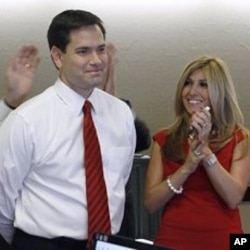The U.S. Republican Party enjoyed a major victory in last Tuesday's congressional midterm elections, winning back control of the House of Representatives and gaining seats in the Senate. Republicans are giving the conservative Tea Party movement a lot of credit for their success, but political analysts say the Tea Party could turn into a mixed blessing in the months ahead.
The Tea Party is not a political party but more of a grassroots conservative and libertarian movement dedicated to reducing the power and size of the central government in the lives of ordinary Americans.
The Tea Party movement does not have one leader and is made up of hundreds of small activist groups around the country, which in turn helped dozens of Republicans win congressional races on November 2nd.
Among those who benefitted from the Tea Party is the new Senator-elect from Kentucky, Rand Paul. "We've come to take our government back," Paul said.
Paul and other Tea Party favorites like to cite the grassroots nature of the movement, and they in turn have vowed to carry out the Tea Party's aim of smaller government in Washington.
In addition to Rand Paul, Tea Party activists rallied around winning Republican Senate candidates in Pennsylvania, Utah and Florida, where Republican Marco Rubio emerged victorious in a three-way race.
But in the wake of his victory, Rubio had a message for fellow Republicans in Washington. "This election is not an embrace of the Republican Party," he said. "It is a second chance to be about principle and values."
Former Republican Congressman Dick Armey of Texas is one of several national organizers of the Tea Party movement. Armey says Republicans will be held to their campaign promises to cut government spending and taxes and confront President Obama in the months ahead.
"The voters have said to Washington, no, we don't take instructions from you, we don't follow your lead. You are not in charge. You are hired hands. We are in charge and yes, we want action, but we want action on our agenda, on America's agenda," he said.
Not all Tea Party endorsed candidates succeeded. Republican Senate candidates lost in Nevada and Delaware and experts say that better candidates in those two races might have helped Republicans retake control of the Senate.
Republican leaders have acknowledged the role Tea Party support played in this year's midterm elections, and at least for now they say they welcome the scrutiny of the Tea Party to make sure they deliver on their campaign promises.
"And Tea Party activists will continue to energize our party and challenge us to follow through on our commitments," said Senate Republican leader, Mitch McConnell of Kentucky.
The influx of new senators with allegiances to the Tea Party movement could complicate McConnell's job to unite Republican senators on various issues that come before the Senate.
"It is an activist group and they are going to demand that the party pay heed to their agenda," said Bob Benenson, a senior political analyst for Congressional Quarterly and the Roll Call newspaper. "This is why we voted for you, this is why we worked so hard for you, we want what is coming to us."
Tea Party activists overwhelmingly supported Republican candidates this year and gave the party new life after big congressional losses in 2006 and 2008.
But pollster John Zogby says the increasing influence of the Tea Party could lead to some congressional splits between Tea Party loyalists and moderate Republicans.
"Their first battle is to define the heart and soul of their party," he said. "For Republicans, is it the establishment, inside-the-beltway [Washington] Republican Party, or is it the Tea Party? And they have got to decide that."
Looking ahead, many analysts expect the Tea Party movement to have a big influence on the battle for the Republican Party's presidential nomination in 2012, with several candidates eager to appeal to a group that has already proven it can mobilize voters.
But University of Virginia expert Larry Sabato says there is a down side to excessive Tea Party influence within the Republican Party. "They are going to try to have a tremendous impact on the Republican side," he said. "They are going to try to pick the nominee. The problem of course is that the Tea Party is well to the right. It is further to the right than the country, there is simply no question about that."
Tea Party activists already have in mind several potential presidential contenders for 2012, and at the top of the list are former Alaska Governor Sarah Palin, former House Speaker Newt Gingrich and conservative TV talk show host Glenn Beck.





